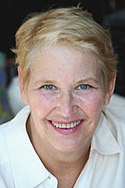Annie Dillard Quote
As symbol, or as the structuring of symbols, art can render intelligible -- or at least visible, at least discussible -- those wilderness regions which philosophy has abandoned and those hazardous terrains where science's tools do not fit. I mean the rim of knowledge where language falters; and I mean all those areas of human experience, feeling, and thought about which we care so much and know so little: the meaning of all we see before us, of our love for each other, and the forms of freedom in time, and power, and destiny, and all whereof we imagine: grace, perfection, beauty, and the passage of all materials to thoughts, and of all ideas to forms.
As symbol, or as the structuring of symbols, art can render intelligible -- or at least visible, at least discussible -- those wilderness regions which philosophy has abandoned and those hazardous terrains where science's tools do not fit. I mean the rim of knowledge where language falters; and I mean all those areas of human experience, feeling, and thought about which we care so much and know so little: the meaning of all we see before us, of our love for each other, and the forms of freedom in time, and power, and destiny, and all whereof we imagine: grace, perfection, beauty, and the passage of all materials to thoughts, and of all ideas to forms.
Related Quotes
About Annie Dillard
